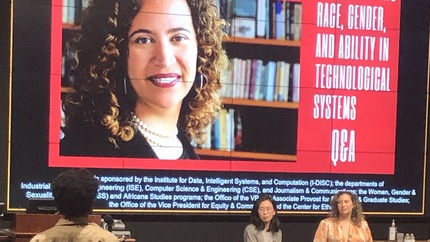Meredith Broussard delivers inaugural DCEJ Seminar
Understanding Race, Gender, and Ability in Technological Systems
Data Journalist, Meredith Broussard delivers the inaugural I-DISC Data and Computing Equity and Justice (DCEJ) lecture on April 6.
Photo credit: Devin Curry

"Understanding Race, Gender, and Ability in Technological Systems"
Data journalist Meredith Broussard delivered the inaugural I-DISC Data and Computing Equity and Justice (DCEJ) lecture on April 6, 2022. Over 150 people attended in person or via Zoom webinar. Those that attended in person, enjoyed a chance to discuss and reflect on the lecture during the reception that followed.
Abstract: Technological neutrality is a myth; algorithms need to be held accountable. Join Meredith Broussard, a data scientist who has worked in journalism and software development, to explore how technologies designed to boost convenience are also prone to perpetuating bias. From sensors trained only to recognize lighter skin tones and the dangerous feedback loops that arise when predictive policing or medical diagnostic algorithms are fed on discriminatory data, real-world bias always emerges inside technological systems. How can we address this issue? The latest research in algorithmic accountability reporting and public interest technology may hold promise.
Biography: Meredith Broussard is Associate Professor at the Arthur L. Carter Journalism Institute of New York University and Research Director at the NYU Alliance for Public Interest Technology. She is the author of Artificial Unintelligence: How Computers Misunderstand the World, and a forthcoming book on the intersection of technology, race, gender, & ability. Her work has been featured in The New Yorker, The New York Times, The Atlantic, BBC, Wired, The Economist, and more. She appears in the 2020 documentary “Coded Bias” and serves on the advisory board for the Center for Critical Race & Digital Studies. More information at @merbroussard or meredithbroussard.com.
This event was sponsored by the Institute for Data, Intelligent Systems, and Computation (I-DISC); the departments of Industrial & Systems Engibeering (ISE), Computer Science & Engineering (CSE), and Journalism & Communications; the Women, Gender and Sexuality Studies (WGSS) and Africana Studies programs; the Office of the Vice President and Associate Provost for Research and Graduate Studies; the Office of the Vice President for Equity and Community; and the Center for Ethics.

